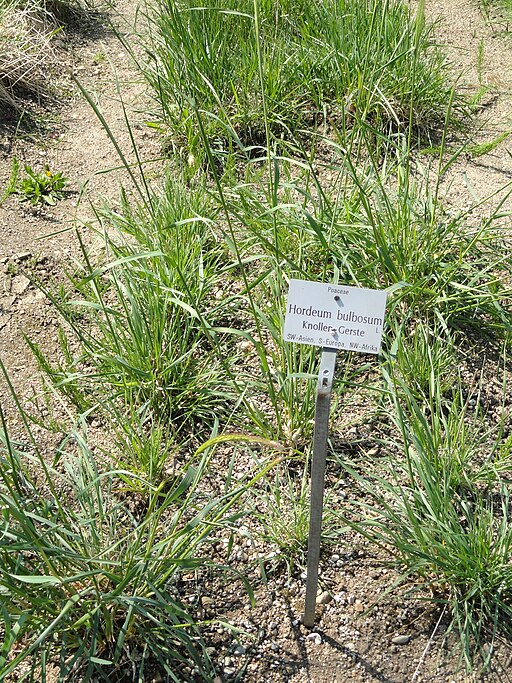Classification System: APG IV
Superregnum: Eukaryota
Regnum: Plantae
Cladus: Angiosperms
Cladus: Monocots
Cladus: Commelinids
Ordo: Poales
Familia: Poaceae
Subfamilia: Pooideae
Tribus: Hordeeae
Subtribus: Hordeinae
Genus: Hordeum
Species: Hordeum bulbosum
Name
Hordeum bulbosum L.
References
Cent. pl. II::8. 1756 (Amoen. acad. 4:304. 1759)
USDA, ARS, National Genetic Resources Program. Germplasm Resources Information Network - (GRIN) [Online Database]. [1]
Hordeum bulbosum, bulbous barley, is a species of barley native to southern Europe, northern Africa, the Middle East and as far east as Afghanistan, with a few naturalized populations in North America, South America and Australia. Since 1970 it has been used in the Hordeum bulbosum Method (or Technique) to produce doubled haploid (DH) wheat and barley plants by crossing it with T. aestivum or H. vulgare, followed by the elimination of the H. bulbosum chromosomes from the offspring.[2] These DH plants are important in breeding new varieties of wheat and barley, and in scientific studies. H. bulbosum is also being looked at as a source of genes for disease resistance and other traits for barley crop improvement.[3]
References
Cent. pl. II:8. 1756 (Amoen. acad. 4:304. 1759)
Devaux, P. (2003). "The Hordeum bulbosum (L.) method". Doubled Haploid Production in Crop Plants. pp. 15–19. doi:10.1007/978-94-017-1293-4_3. ISBN 978-90-481-6393-9.
Ullrich, Steven E. (2011-01-25). Barley: Production, Improvement, and Uses. ISBN 9780813801230.
Retrieved from "http://en.wikipedia.org/"
All text is available under the terms of the GNU Free Documentation License


